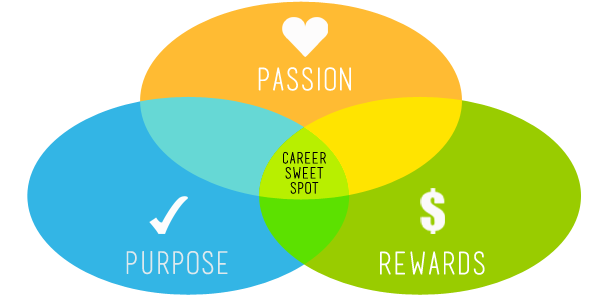Compare courses from top Australian unis, TAFEs and other training organisations.
Find Your Career ‘sweet Spot’
Are you satisfied with your career? What’s holding you back? In our latest guest post, author Maria Simonelli helps you discover your career ‘sweet spot’.
Maria Simonelli
May 28, 2014
It’s interesting that in a time when we have so much – opportunities, resources, ways to create a meaningful and rewarding career – we find that nearly half of those surveyed in the UK, the US and Australia say they are in jobs they would trade today if they could.
In Australia, job dissatisfaction has hit an all-time high, with more than 80 per cent of workers considering changing jobs. The modern workplace is afflicted with two main career dilemmas – a plague of job dissatisfaction and the related uncertainty about how to choose the ‘perfect’ career.
Why is choosing a fulfilling career such a challenge and why does it come with so much pressure?
It could start with the myth that we are fed from a young age: that there is one perfect job out there that will fulfill all our needs, use our talents and skills, that will be consistent with our values, that we’ll derive purpose from, pays really well, with people we love being around, we’ll know what it is by the time we leave school.… and we’ll do it for about 45 years.
This myth has led many to stay in unsatisfying jobs and persist in industry sectors that do not match their values. It also creates a deep fear when we question any desire to change.
What’s your career sweet spot?
Whether or not we consciously realise it, we all seek a career that gives us:
- Passion (we love doing it),
- Purpose (we are good at it and we add value),
- Rewards (we get paid well and we have high satisfaction).
We need these three areas to be fulfilled in order to find our career sweet spot. When one or more of these areas is found wanting, we could find ourselves asking questions like:
- How can I make a difference?
- Does money mean happiness or equate to job satisfaction?
- What rewards am I seeking?
- How am I adding value in my current role, and to whom?
How do you know you’re ready for a career change?
Usually there’s a combination of signs and a set of reflections, challenges and frustrations that signal it’s time for change.
The three most common problems that clients in my career redesign program express, are:
- They’re often feeling bored and frustrated in their current roles
- They’re overcome with fear from the financial or other risks of a career change
- Or they just don’t know where or how to start.
Inevitability they stay stuck in unfulfilling roles, losing motivation as time creeps on, and this impacts on other areas of their lives.
Are you sabotaging your own career change?
Do any of these sound familiar?
- The change did not happen fast enough, so I panicked, abandoned the process and went back to the roles I’d done before;
- I don’t want to waste skills that I have spent years of time and money developing, so I’ll just wait for that great role to appear;
- I’ll stay in this dissatisfying job, it’s the boss and the company’s fault and they should solve it;
- If I ignore my career dissatisfaction, it will go away.
All of these beliefs are driven by an expectation that an external force can solve your career problems. If you hear yourself saying any one of these things, then use it as a catalyst to examine your current situation and look inwards for an answer.
Myths about career change
Apart from the single biggest myth about finding your ‘perfect’ career, there are several other common myths we often tell ourselves.
Maybe you think you’re too old to make a career change, or you’re being selfish thinking that you deserve a new, more satisfying career.
Both of these common myths are perpetuated by stereotypes such as older workers can’t learn new IT skills or that another global crisis is just around the corner, so don’t rock the boat. The result is that you end up staying in unfulfilling roles, paralyzed by the fear of change.
(And, by the way, a 2011 survey showed that older workers were the fastest growing users of technology.)
Risks associated with a career change
Apart from these common myths, there are a number of fears we need to confront when we consider a career change.
The most common is the financial risk. Will I have enough money? Can I make money from something I love doing? Should I stay on this secure wage?
The other most commonly cited risks are:
- Competence – can I develop the skills I need to perform the tasks of me?
- Social – what will others think?
- Identity – will I be able to adopt this new identity and feel secure?
- Relational – will my family support me in making the changes I seek?
- Unknown – will I allow myself the chance to explore, learn and possibly fail?
So think about what keeps you up at night that could be creating anxiety and holding you back from a career change.
A key to managing risk is to find ways to first identify the specific risk, and then to make it smaller so we are not overwhelmed by it. The nature of risk is that we’ll never really know for certain the outcome, no matter how concrete or small we make the risk.
We can, however, prepare for risk taking by:
- Converting the bigger risks into smaller chunks to reduce the potential impact of the risk.
- Acknowledging that risk taking is a skill. That means we can get better at it with practice. We can experiment by taking smaller, more manageable risks.
- Acknowledging fears – get them out of your head and put them out there so that you can assess, challenge and face them.
Is your self-esteem holding you back?
We also know the links between self-esteem and careers are strong, so if you are hesitating with a career change, maybe you need to reflect on your view of yourself.
Having a healthy self-esteem is not boastful or arrogant, and while it may be intangible, it is easy to spot.
It’s about having a high regard for yourself and for your talents, skills and temperament. It’s also associated with an elevated sense of personal responsibility. Those with self-esteem rarely blame others for their problems.
Its also about knowing your own self-worth, which gives you a profound sense that you are here for a reason or purpose which in turn shows a sense of reverence for life.
A large part of the task of achieving a healthy self-esteem lies simply in getting to know yourself better – discovering the ideas and things that are important to you, and knowing why they are important.
Actively work on a plan to build your self-esteem through creating a new picture of yourself. Formulate in as much detail as you like what you want your life and your self to exhibit. Begin with the broad and move in from there to help redesign your career.
No career change will magically materialise out of the blue. It will take effort, extending into the unknown, living with uncertainty, and experiencing confusion and mini realisations along the way.
So take the time to think about your ultimate goal, the breakthroughs you’ll have along the way and how you can create a re-energised you.… and you’ll find your career sweet spot.
Maria Simonelli is the creator of Sweet Spot Careers, offering a range of career redesign programs and services. Having transitioned across careers many times herself, she published her book Sweet Spot: a creative approach to a successful midlife career transition in 2014. It focuses on the essential elements of finding clarity, understanding and overcoming the associated fears and risks of change, identifying enablers and setting priorities to create a plan to move into action.
About the author
Maria Simonelli offers career advice on personal growth, education, and professional skills in her articles on Career FAQs.


